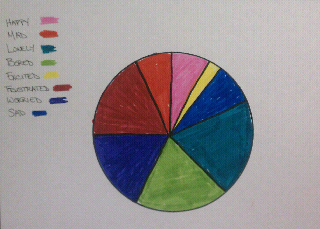Psychotherapists come to people who have experienced a tragedy, faced with misunderstanding and experiencing mental pain. But there are other situations when everything is joyful and positive in the outside world, and the client literally excludes himself from this stream, hides and yearns. In cases where the cause of what is happening is not clear, art therapy can help, says psychotherapist Tatyana Potemkina.
We make the decision to move to another country in the hope that our life will become better. Not necessarily easier, but more interesting, brighter, more prosperous. And we are ready for difficulties. But we are waiting for them from outside: a new language, customs, environment, tasks. And sometimes they come from within.
By the time Julia, 34, contacted me via Skype, she had not left the house for five months. In the Scandinavian country where she moved two years ago, she was not in danger. My husband tried to spend as much time at home as possible. When he was absent, he sent an assistant if she needed something. And Julia was getting worse.
“I go to the door and break out in a cold sweat, it’s dark in my eyes, I almost faint,” she complained. I don’t understand what’s happening to me!
When “nothing is clear”, art therapy can help. I asked Julia to prepare paper and gouache for the next session. And she assured me that you don’t need to be an artist. “Open all the jars, take a brush and wait a bit. And then do whatever you want.»
Julia dipped the brush in several colors in a row and left long streaks on the paper. One leaf, another… I asked how they made her feel. She replied that it was very sad — like when her brother died.
The accumulated pain found a way out, releasing energy. Fear weakened
Ivan was her cousin. Peers, they were friends in childhood, they spent the summer at a common dacha. They called back as teenagers, but Yulina’s parents no longer wanted them to meet: it became known that Ivan was addicted to psychoactive substances.
At 20, he died of an overdose. Julia believed that he himself was to blame, since he disposed of his life so ridiculously. But she regretted that she could not help him. It was a mixture of anger, sadness, guilt. She did not like this confusion, she tried to forget Ivan and plunged headlong into her studies, then into her career: she hosted a popular TV program, she was recognized on the streets.
There was also a personal life. Julia became the wife of a successful entrepreneur, whom she appreciated for her cheerful character. They made the decision to emigrate together and did not doubt its correctness.
The husband continued his business, and Yulia decided to follow his example by opening Russian language courses. But things didn’t work out. She was afraid to start another.
“I have never been a dependent,” Yulia said, “and now I am sitting on my husband’s neck. It depresses me…
— How is your current state of health connected with the memories of your brother?
— I thought that we are completely different, but we are similar! I can’t handle it either. Vanya has become a burden for his parents. They felt sorry for him, but when he died, they seemed to be relieved. Would it be the same with me?
Again and again I encouraged Julia to use paint to give color and form to feelings. She mourned the losses: the death of her brother, her impotence, separation from her parents, the change in social status and the loss of the admiration that surrounded her before …
The accumulated pain found a way out, releasing energy. Fear weakened, and Julia returned to life — and to herself. The day came when she went outside and rode the subway. “Next, I myself,” she said goodbye to me.
Recently, a message came from her: she received a new education and is starting to work.










